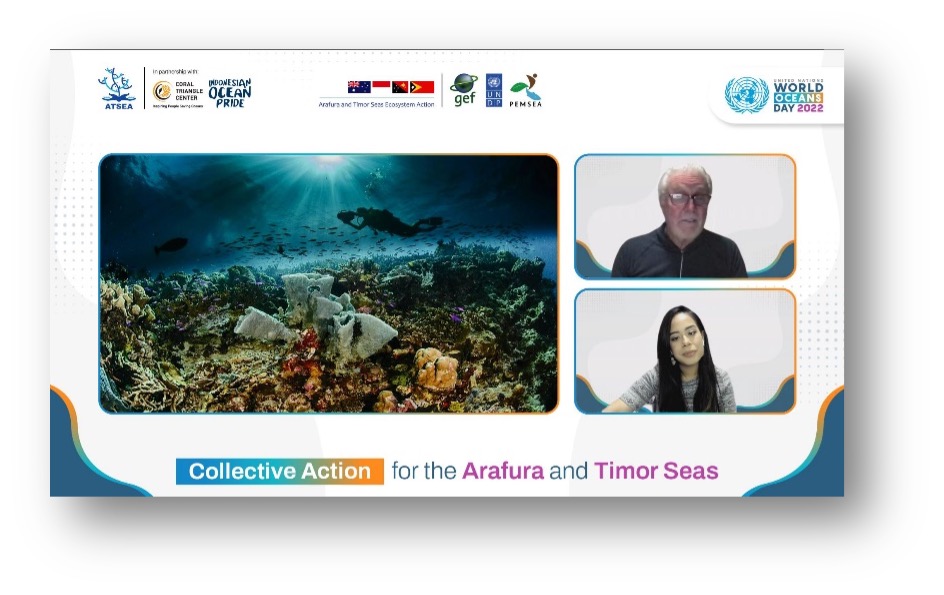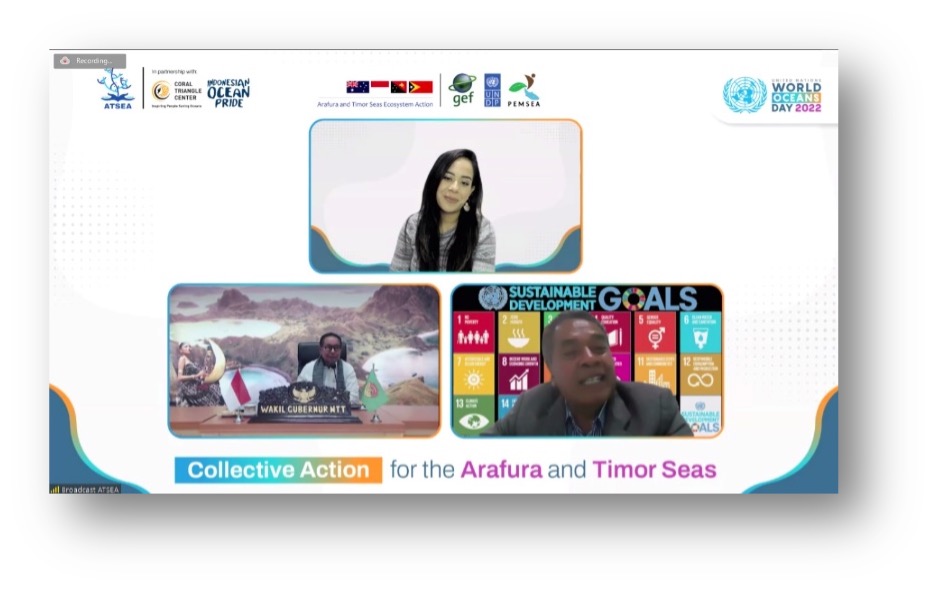The ocean connects, sustains and supports us all. Yet its health is at a tipping point and so is the well-being of all that depend on it. To restore balance to the ocean, we must work together.
The Arafura and Timor Seas (ATS) region is home to coral reefs, a quarter of the world’s mangroves, seagrass beds, large marine fauna, shorebirds and seabirds – not to mention a dazzling array of fish species. This region provides important ecosystem services for communities in littoral nations bordering the ATS, while also contributing to global economic and ecological wellbeing.
In conjunction with World Ocean Day, the ATSEA-2 Project conducted a virtual webinar on 14 April 2022 that brought together government, policymakers, experts, professionals and community leaders on marine ecology and environment of the ATS region to discuss the importance of protecting and revitalising our ocean.
The oceans play a crucial role in regulating climate and weather patterns and are vital to the world’s economy. According to the Organisation for Economic Co-operation and Development (OECD), oceans contribute US$1.5 trillion annually in value-added to the overall economy. This number could reach US$3 trillion by 2030. More than 3 billion people rely on the oceans for their livelihoods, with the vast majority in developing countries, where ocean-based industries such as tourism and fisheries are key sources of income.
“With only 8 years to go to deliver UN Sustainable Development Goals (SDG) by 2030, particularly SDG14, it is critical that all perspectives are brought to the table and diverse approaches are explored, so that revitalization efforts can complement and amplify each other,” says Dr. Handoko Adi Susanto, ATSEA-2’s Regional Project Manager.


“As we work to build back better from the COVID-19 pandemic, let us all come together to promote ocean science and meaningful innovations that will save the lifeblood of our planet,” Dr. Handoko added.
This is where ATSEA-2 is working to make a difference. In 2021, more than 32,000 individuals were successfully engaged by the Programme, through a series of coordinated regional and country efforts comprising a combination of FGDs, training sessions, workshops, surveys and forums. Through the active support and participation of stakeholders, the Programme has conducted detailed assessments and engaged in discussions relating to regional governance; gained a better understanding of the nuances, social and environmental risks in project sites, which also led to the completion of the regional and national social and environmental management plans for the ATS region, as well as the Gender Equity and Social Inclusion (GESI) Analysis and Action Plan; and completed several environmental thematic studies and assessments at the regional and national levels.
This year’s United Nations World Oceans Day highlights the theme ‘Revitalization: Collective Action for the Ocean.’ This year’s celebration becomes even more meaningful, as it coincides with the 50th anniversary of the Stockholm Declaration – the first global conference to place the environment at the forefront of international concerns.
Organised in partnership with ArgoAsia and supported by Indonesia Ocean Pride, the Coral Triangle Centre and UNDP Timor-Leste, ATSEA-2 aims to shed light on the communities, ideas and solutions that are working together to protect and revitalise the ocean in the ATS region and everything it sustains.
The main speakers at the webinar included ATSEA-2 Regional Project Manager, Dr Handoko Adi Susanto; Executive Director of the Coral Triangle Centre, Rili Djohani; ATSEA-2 Project Regional Biodiversity Specialist, Casandra Tania; and UNDP Timor-Leste Head of Climate and Environment Unit, Domingos Lequi Siga Maria.
The webinar also featured the Author of Wild Colourful PNG, Randy K. Harwood; Deputy Governor of Nusa Tenggara Timur, Drs. Josef Nae Soi; and the Founder of Indonesia Ocean Pride and public figure, Hamish Daud.
Established in 2019, The ATSEA-2 Project supports the implementation of the following governance and environmental objectives in the ATS regional Strategic Action Programme (SAP): (i) strengthening regional governance in the Arafura and Timor Seas (ATS); (ii) recovering and sustaining fisheries; (iii) restoring degraded habitats for the sustainable provision of ecosystem services; (iv) reducing land-based and marine sources of pollution; (v) protecting key marine species; and (vi) adapting to the impacts of climate change.
A recording of the webinar is available at the ATSEA-2 Programme’s YouTube Channel


